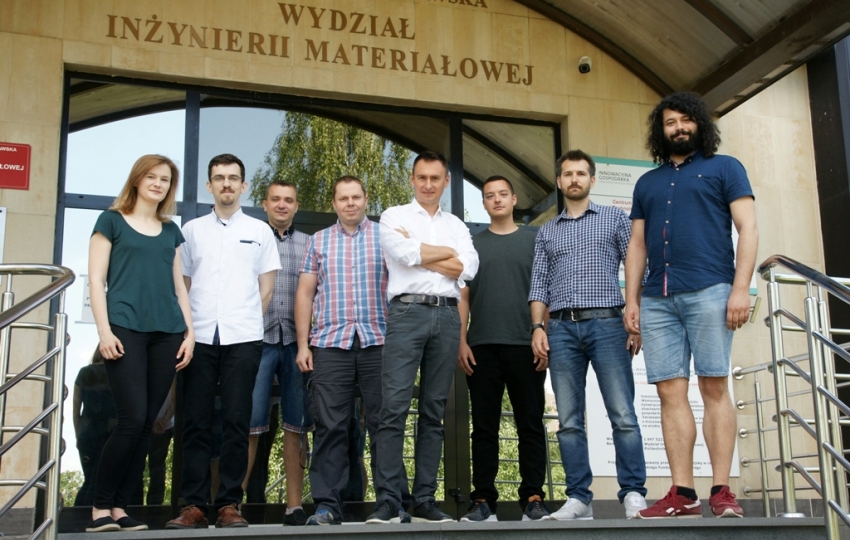Computer modeling in materials design
The scope of research includes design of novel engineering materials with particular emphasis on computer modeling techniques of structure, properties and materials processes. The main area of interest are materials applied in molten carbonate fuel cells (MCFC), open porous foam materials applied as filters and heat exchanger materials, as well as nanometals, dispersive composites and semiconductors.
The applied modeling methods are: molecular dynamics, DFT, finite element method, finite volume method, Monte Carlo method. Characterization techniques applied in the performed studies are scanning electron microscopy, computer tomography, mechanical testing (static tensile tests), atomic force microscopy. A relevant area of research activity is image analysis and quantitative description of materials structure based on the results obtained from the abovementioned characterization methods.
Research activities
- Nanocrystalline materials – influence of grain size on mechanical properties and thermal stability
- Intercrystalline and interphase boundaries – determination of the influence of grain boundaries and interphase boundaries on mechanical, chemical and thermal properties of materials including: nanometals, composites with graphene addition, materials for thermonuclear reactors
- Group IV semiconductors – calculations of electron, structural and thermal properties and defects, modeling of manufacturing processes of semiconductors with PVT and CVD techniques
- Molten carbonate fuel cell materials – design and modeling of the influence of structure of molten carbonate fuel cell components
- Composites with copper and silver matrix with addition of graphene – thermal conductivity of metal-graphene interphase boundaries, influence of the amount and spatial distribution of graphene in the matrix on thermal conductivity of metal-graphene composites
- Construction composites – numerical design of large-size supporting structures including internal structure of the material
- Porous materials – modeling of the influence of structure on properties of open-porous materials applied as filters, fuel cell electrodes, heat exchangers and energy absorbers,
- Shale rocks – modeling of properties and process of mass transfer of fluids
- Processes of heat recovery from automotive exhaust systems – calculations of gas flow and heat transfer
- Processes of interaction of electromagnetic wave with materials
Research offer
- Design and manufacturing of materials for fuel cells
- Design of open-porous materials
- Numerical analysis of mechanical properties
- Numerical analysis of mass transfer properties
- Numerical analysis of heat transfer properties
- Simulations of material properties and processes in atomic scale
-
Image analysis and quantitative description
Projects
- High efficiency molten carbonate fuel cells, NCRD, PBS3/B4/14/2015, 2015-2018
- Innovative matrix materials for molten carbonate fuel cells, PL-TW14/2/2016, 2016-2018
- Defect engineering in crystal growth of electronic materials, Era.NET-RUS-PLUS, 1/RUSPLUS-INNO, 2015-2018
- Development of high gauge factor piezoresistive MEMS sensors for harsh environment via combined high-throughput simulations and experiments POL-SINIV/3/2018, 2018-2020
- Innovative carbon-ceramic composite materials as technologies for CO2 capture and utilization for balanced energy, M-ERA_NET2/2016/04/2017, 2017-2020.
- Improved fabrication of fuel cells for extended durability, improvement of working parameters, in particular power per volume/mass unit of the fuel cell and reduction of investment and exploitation costs by application of alternative catalytic systems in printing technology, POIR.01.02.00-00-0045/16, 2016-2019
- Development of technology for noble metals and rare earth elements recycling for fabrication of molten carbonate fuel cell elements, POIR. 01.02.00-00-0086/17-00, 2017-2020
- Development of commercial construction of molten carbonate fuel cells and ceramic electrolyzers allowing for integration with power-to-gas energy systems, POIR.01.02.00-00-0281/16
- Super-IcePhobic Surfaces to Prevent Ice Formation on Aircraft, 690817/ H2020-MG-2015_SingleStage-A
Research collaboration
National collaboration
- Institute of Electronic Materials Technology, Warsaw
- Institute of Power Engineering, Warsaw
- Institute of Fundamental Technological Research, Polish Academy of Sciences, Warsaw
- Interdisciplinary Centre for Mathematical and Computational Modelling, University of Warsaw
- Institute of Experimental Physics, Department of Physics and Astronomy, University of Wrocław
- Institute of Physics, Jagiellonian University, Kraków
- Faculty of Metals Engineering and Industrial Computer Science, AGH University of Science and Technology
International collaboration
- Dresden Center for Nanoanalysis (DCN), Center for Advancing Electronics Dresden, Technische Universitat, Germany | prof. Ehrenfried Zschech
- Institute of Stochastics, Ulm University, Germany | prof. Volker Schmidt
- Fraunhofer Center for Silicon Photovoltaics, Germany | prof. Peter Dolt
- Department of Engineering, University of Perugia, Italy | prof. Linda Barelli
- Theory and Modelling Department, Culham Centre for Fusion Energy (CCFE), Great Britain | prof. Duc Nguyen-Manh
- Department of Materials Science and Engineering, National Cheng Kung University, Taiwan | prof. Kuan-Zong Fung
- School of Mechanical and Aerospace Engineering, Nanyang Technological University, Singapore | prof. Siew Hwa Chan
- Department of Chemical and Biological Engineering, Hanbat National University, South Corea | prof. Choong-Gon Lee
- Singapore, Institute of High Performance Computing, ASTAR | dr Tan Teck Leong
- Department of Mechanical and Industrial Engineering, Concordia University, Canada | prof. Ali Dolatabadi
- University of Averio, Portugal | prof. Fernando Marques
- University of Oslo, Norway | prof. Truls Norby
- SINTEF, Norway | dr Wen Xing
-
Department of Mechanical Engineering, University of Cape Peninsula, RSA | prof. Graeme Oliver
Contact
Professor Tomasz Wejrzanowski
tomasz.wejrzanowski@pw.edu.pl
+48 22 234 87 42
Division of Materials Design

